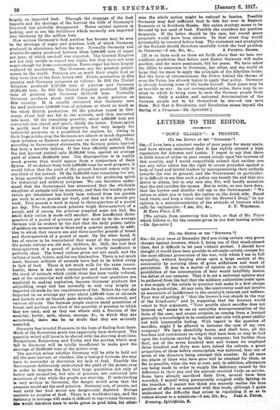(To THE EDITOR or THE " SPECTATOR:9 Sia,—In your issue
of December 23rd you bring certain very grave charges against brewers, which I, being one of that much-abused class, find it difficult to let pass without protest. I should have thought it would have been possible to advocate certain courses for the most efficient prosecution of the war, with which I am in full sympathy, without heaping abuse upon a large section of the community by accusing them of gross selfishness and want of patriotism. It may be a matter of opinion as to whether total prohibition of the consumption of beer would infallibly hasten the defeat of our enemies. That it is not a universal opinion may be gathered from the fact that the military authorities insist upon a due supply of the article in question and make it a first charge upon its production. At any rate, the controversy need not involve an accusation of indifference to the country's interest and welfare. Your way of putting it " that the brewer's van stands in the way of the bread-cart," and in supposing that the brewers would retort to that argument, " Your prattle about sacrifice does not interest us," seems to me an unworthy misrepresentation of the facts of the case, and causes surprise as coming from a journal generally acknowledged to be conducted not only with great ability but with honourable feeling. With regard to the question of sacrifice, might I be allowed to instance the case of my own company? We have cheerfully borne, and shall bear, all the burdens and restrictions on output that have been or may be laid upon the business carried on by this company; but further than that, out of the seven hundred men and women we employed three hundred and forty men have joined the colours, a great proportion of these before conscription was enforced, four out of seven of the directors being amongst this number. In all cases the places of those who have gone will be retained for them, as far as possible, when the war is over, and, in addition, allowances are being made in order to supply the deficiency caused by the difference in their pay and the amount received while on service. Some have already sacrificed their lives, several have been wounded, I myself being permanently crippled while fighting in the trenches. I cannot but think you scarcely realize the true position of affairs as connected with this trade, although I quite understand the difficulty that arises in regulating it so as to reduce abuses to a minimum. —I am, Sir, &o., Toms A. Patna, Brewery, Spitalftelds. B.










































 Previous page
Previous page